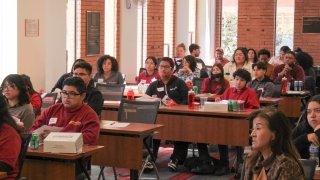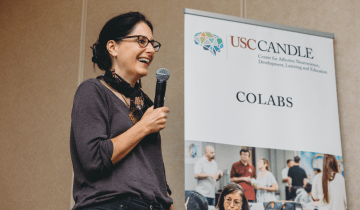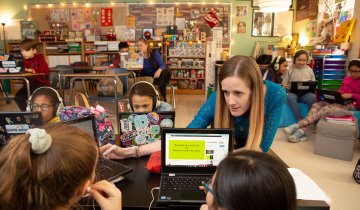On Wednesday, Feb. 21, 2024, USC Rossier’s Center for Education, Identity and Social Justice hosted 30 USC Hybrid High School students on the USC University Park Campus. The students enjoyed a full agenda: they participated in a session focusing on university admissions and financial aid, met with current USC students, had lunch with USC Rossier Dean Pedro Noguera and Chair of USC Rossier’s Board of Councilors Mary Atwater James, and toured the USC grounds—including a stop at USC Athletics where they bumped into some of USC’s star student athletes.
The day focused on giving the students information about and exposure to first-generation, Latino and Black-centered experiences at USC as well as information about the various academic and social supports available to students on the USC campus, Center founders and co-directors Shafiqa Ahmadi and Darnell Cole said. This focus is especially important considering that 97% percent of USC Hybrid High students identify as either Black or Latino and 84% qualify for free or reduced lunch.
Developed by the USC Rossier School of Education with the goal of serving the students from the neighborhoods around the University Park campus, USC Hybrid High College Prep opened its doors in 2012. Ednovate, the public charter network that operates USC Hybrid High, has since opened an additional seven schools, all with the goal of preparing students from traditionally underserved areas for college. The students’ visit to USC on Feb. 21 is just one of many efforts the school makes to foster a college-going environment for students.
The results of these efforts have been impressive: 100% of USC Hybrid High students have been accepted to college. With a desire to better understand the experiences of USC Hybrid High students both while enrolled at the school and after they go to college, the USC Rossier Center for Education, Identity and Social Justice conducted a six-year longitudinal study of USC Hybrid High graduates from the classes of 2016 and 2017. The study, conducted by Ahmadi, Cole and their research team and funded by Mary Atwater James, aims to identify ways that high schools like USC Hybrid High can better prepare students for higher education while they are students and post-graduation, and how colleges can better support students while enrolled and after graduation.
“I am deeply honored to support USC Hybrid High,” James said. “Graduates emerging from the school exhibit resilience and confidence, and are well-prepared to navigate the next steps in their lives. Their dedication to pursuing post-secondary education is a testament to their hard work. My gratitude extends to the dedicated teachers and staff at Hybrid High, who not only equip students for the challenges ahead but also foster an environment of warmth and inclusivity.”
The Center for Education, Identity and Social Justice released their first report on the study in 2020. The initial report, based on analysis of interviews and survey data, focused on participants’ transition from high school to college.
“When students feel a sense of cultural relevance, engagement and validation in their educational space they are more likely to feel like they belong and that they matter to the institution they attend,” Cole said of the report’s findings. Key takeaways included:
- Students’ sense of belonging to USC Hybrid High was higher for students who were currently attending college compared to those who were not.
- While USC Hybrid High students rated the school’s cultural responsiveness highly (above a 4 on a 5-point scale), students who were attending college rated the school’s cultural responsiveness higher than those who were not currently enrolled in college.
- The study found statistically significant correlations between the school’s cultural relevance and cultural responsiveness and students’ sense of belonging and education satisfaction.
On Feb. 21, the Center released its second report which focuses on participants’ experiences at college and post-college. The research team found that as time passed, students’ sense of belonging to both USC Hybrid High and their colleges declined. Additionally, fewer participants completed the requested surveys by year three of the study, likely due to the challenges presented during the COVID-19 pandemic. Drawing from the qualitative interviews and survey data, the team created recommendations for USC Hybrid High and colleges to better support students. “These recommendations,” Ahmadi said, “are essential for supporting students as they continue to succeed and make multi-generational change through education.”
Recommendations for USC Hybrid High include:
- Increase the rigor of classes to better mimic college coursework.
- Promote Historically Black Colleges and Universities to the school’s Black students.
- Increase communication and connection to USC Hybrid High alumni by promoting employment opportunities and hosting career workshops.
Recommendations for colleges include:
- Increases resources aimed at preparing students for graduate school, including offering students the opportunity to participate in research projects.
- Hire mental health professionals whose identities are similar to the students they serve.
- Professional development courses to better prepare students for the workforce.
“Addressing students’ professional, academic and mental health is crucial to their sense of belonging and mattering to their high school and colleges.” Cole said. The center hopes to secure additional funding to continue its work with USC Hybrid High School.






